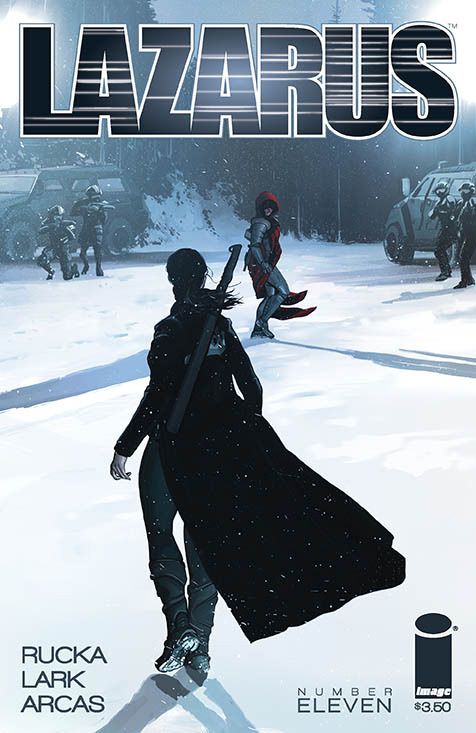Greg Rucka and Michael Lark deliver another pitch-perfect, phenomenal issue of "Lazarus" with part two of the "Conclave" story arc, as Forever pushes boundaries and questions surroundings, while still acting the dutiful daughter (and Lazarus) without fail. But under the surface there is a distinct, masterfully subtle rumbling that only a writer like Rucka can manage. Nobody and nothing is safe, which is why "Lazarus" #11, like each issue before it, is a joy and a terror to read.
Rucka's world building has never been better, cleaner, cooler or more effortlessly executed than in "Lazarus," and issue #11 is a great example of how he pulls it off. Despite a vast world full of complex politics and a wide array of characters, Rucka's storytelling is absolutely organic, exposing readers to tiny slices of this world, each slice proving both epic and intimate and only serving to better hook the reader. Of course, he's at liberty to make those precise and subtle choices without fear of being misunderstood because Lark's visuals are equally as precise and well-considered. "Lazarus" #11 presents Bittner, another house, and its Lazarus, but the way Rucka has them communicating -- only relaying the exact words of their respective "father" and "mother" to the point of literally saying "my mother speaks" when talking, says so much about this world and these characters. It's yet one more way in which this book excels.
Above and beyond the exceptional execution is the fact that Rucka's story is just damned smart. His characters are calculating and clever and the murky politics mean nobody can truly be trusted. There's a real threat from family to family and no love lost even between allies. At the same time, Rucka pulls off the masterful feat of making readers care a little bit even about the arguable ">1% bad guys" that make up most of the leads. By positioning Forever at the center, and making her believable, likable and relatable -- despite being allied with a rather monstrous side -- Rucka accomplishes the impossible: you root for Forever to be okay, even while you wish the system she is intractably tied to would burn to the ground.
Lark's visuals for Lazarus have always walked a magnificent line, keeping a startlingly realistic style while still managing to execute Rucka's new world in creative but believable ways. This particular issue does not call for much in the way of fantastic world building, and it's a rather quiet script overall, but Lark makes the most of it, turning in emotional performances and transforming a gorgeous standoff in the snow into a tense powerhouse of a scene. The tension Lark draws from two women talking on a snowy evening is more than many artists can wrest from the most bombastic action scenes. At the same time the push and pull of Forever's questions and the reactions others have to them is expertly choreographed. Every nuance is accounted for and made crystal clear to readers. It's a fine bit of comics making, and the kind of attention to detail and craft that is often lost in favor of "pretty pictures" that don't actually tell a story. It's a testament to Lark's talent that his Lazarus Sonja flawlessly striking down a solider with a slice of her blade is equally as compelling as two characters standing in awkward silence in the snow.
The colors by Santi Arcas continue to impress. They capture mood and environment so well and are so on point in their realization of those moments and emotional beats that they almost become unnoticeable. They slide so effortlessly into the work as a whole that unless you are paying close attention you do not realize you have slipped from the cold blues of a snow storm to the sickly blue greens of Forever's examination room to the subdued browns of the Carlyle home.
"Lazarus" is Rucka's best work in a long time, which is no small feat given the consistent high quality of his output. "Lazarus" is layered and smart, and with every issue Rucka and Lark deepen and strengthen everything that came before while aggressively pursuing new aspects of the world and characters.

